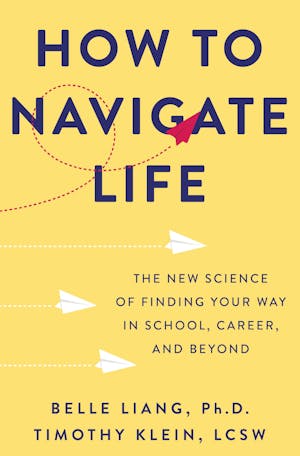Timothy Klein is an award-winning urban educator, clinical therapist, and school counselor. He has served as an Outreach Director for Summer Search, a national youth development non-profit that serves low-income first generation students, was a teaching fellow at Harvard University, and the director of school and community engagement at Medford High School, where he implemented strategies that increased college matriculation by 30 percent. He and Dr. Belle Liang are the co-authors of How to Navigate Life.
Download Bio
 HARDCOVER
|
How to Navigate LifeThe New Science of Finding Your Way in School, Career, and Beyond
St. Martin's Press
An essential guide to tackling what students, families, and educators can do now to cut through stress and performance pressure, and find a path to purpose. |
Navigating An Uncertain Future: Applying The New Science of Purpose In School & Life
Children are innately purposeful: They are intrinsically motivated to engage in the world. As parents, our role isn’t to find our kids’ purpose, but to cultivate it in a world obsessed with performance. Two award-winning educators share evidence-based best practices to guide parents of children, teens, or college students in a rapidly changing world. In keynotes or interactive workshops, parents and educators will be introduced to five principles of purpose and learn how they can support young people in cultivating purpose their academic and career journeys.
From Surviving to Thriving: How Purpose & Belonging Informed Education Can Combat the Great Resignation. Even pre-pandemic, many people were working harder than ever to get ahead in the workplace, while feeling disengaged and questioning their purpose and calling. Covid-19 amplified these struggles, especially in education. Dr. Belle Liang and Timothy Klein, LCSW devote their careers both to training educators and to cutting through the daily pressures to show a better way, a framework, and set of questions to help educators reclaim their “true north”: the intrinsically motivating and noble aspirations that drew them to the field of education in the first place. Liang and Klein will reveal the real cause of the teacher burnout crisis. Here’s a hint: it’s not the long hours, or the demands from students and parents. It’s the emotional exhaustion that arises from a sense of powerlessness and meaninglessness. Thankfully, there is hope. When we tap into the science of purpose, research shows it makes educators more engaged in their work, more resilient in the face of daily stressors and more likely to education work as their calling.
From Surviving to Thriving: How Purpose & Belonging Informed Education Can Combat the Great Resignation. Even pre-pandemic, many people were working harder than ever to get ahead in the workplace, while feeling disengaged and questioning their purpose and calling. Covid-19 amplified these struggles, especially in education. Dr. Belle Liang and Timothy Klein, LCSW devote their careers both to training educators and to cutting through the daily pressures to show a better way, a framework, and set of questions to help educators reclaim their “true north”: the intrinsically motivating and noble aspirations that drew them to the field of education in the first place. Liang and Klein will reveal the real cause of the teacher burnout crisis. Here’s a hint: it’s not the long hours, or the demands from students and parents. It’s the emotional exhaustion that arises from a sense of powerlessness and meaninglessness. Thankfully, there is hope. When we tap into the science of purpose, research shows it makes educators more engaged in their work, more resilient in the face of daily stressors and more likely to education work as their calling.
Take a look at Boston Colleges article about How to Navigate Life.

